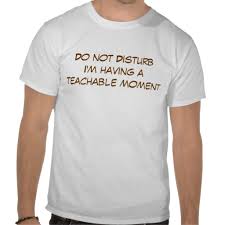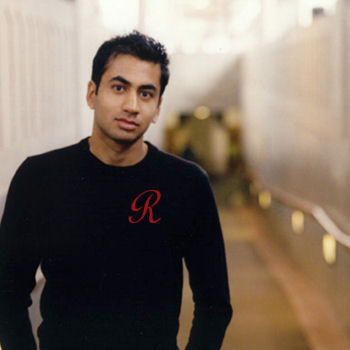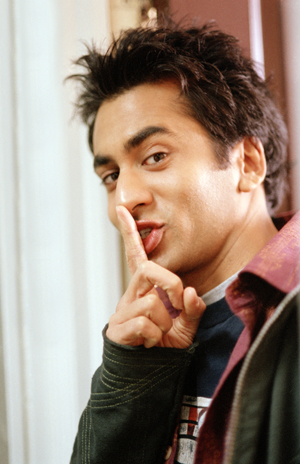
Earlier this week, Kal Penn blew up the Twitterverse.
It all started when Penn — best known to America at-large as “that stoner Indian guy” in that one movie, that “drunk Indian guy” in that other movie, and “that Indian doctor guy” on House — shared a little Twitter love for an op-ed piece by NYC Mayor Mike Bloomberg in support of the city’s controversial “Stop and Frisk” policy.
Or, arguably, it started before that, when Kal Penn briefly left his acting career (requiring House writers to write Penn’s character off the show resulting in one of the series’ most poignant episodes of all time) to join the Obama administration as an Assistant Director in the White House Office of Public Engagement. He got the job in part because Penn is a smart guy with dual bachelors’ degrees from UCLA in film and sociology, and also because he spent the 2008 Obama presidential campaign actively engaging Asian Americans and other minority youth in the political process.
Somewhere along the way, Kal Penn became a minor celebrity among progressives.
Which is why the Twittersphere blew up this week when Penn outed himself as a supporter of “Stop and Frisk”.

Now, let me first be clear: I do not support NYC’s “Stop and Frisk” policy. I agree with the recent federal ruling that the law as written in NYC is unconstitutional, and I further deplore the fact that this policy has effectively legitimized racial profiling in a manner that targets Black and Latino residents of the city, particularly those who also struggle daily with poverty. In practice, this policy has made the very act of being both male and either Black and/or Brown a “suspicious act” justifying harassing search and seizure, and often without an appreciable increase in felony arrests.
I find “Stop and Frisk” reprehensible. I find certain defenses of this policy — those that cite racialized crime statistics in NYC — racist, because they are based on the prejudicial stereotype of Black and Brown criminality without noting the influence of disproportionate law enforcement in specific neighbourhoods of a racially stratified city on those self-same crime statistics.
Kal Penn, and others who defend “Stop and Frisk”, invoke those racialized prejudices when they assume that the racially disproportionate impact of “Stop and Frisk” on minority men is based upon inherent criminality; this, despite ample evidence suggesting that criminality is not a racialized trait particularly when geographic and income factors are taken into account.
But, does the fact that Kal Penn cites these data in error make Kal Penn “a racist”?
The Twitterverse seems to think so. My Facebook and Twitter feeds have exploded over the last few days with a veritable flood of Kal Penn hate-Tweets. Many of them expressed disgust and hatred… but not of Kal Penn’s political opinion, but towards his character. Summarizes Penn in a response to the fiasco on the Huffington Post this morning:
[O]n Tuesday, I tweeted a link to Mayor Bloomberg’s op/ed on the “stop & frisk” decision, and in a matter of minutes I became a racist asshole who deserves to eeaaaat shiiiiiiiit. Huh?
Like I said, I don’t agree with Kal Penn on “Stop and Frisk”. I was disappointed by his invocation of racialized crime statistics in his initial Twitter-based defenses of the policy.
But, was the Twitter pile-on necessary?
Clearly, Twitterverse explosions are so commonplace these days that this one scarcely caused a blip elsewhere in the world. The past decade is rife with stories of celebrities — major or minor — saying something or another that people disagree with and triggering an avalanche of hatemail via Tweet; so much so that celebrities even routinely deactivate their Twitter accounts to escape the aftermath of some ill-advised comment or another.

Twitter has become a great equalizer, that has had two major cultural effects: 1) all Tweets have the same impact. Whether you are former President Bill Clinton offering the latest global solution on climate change, or a twelve-year-old troll who peppers every sentence with liberal use of schoolyard epithets, your Tweets are equally weighted on my Twitter feed, and 2) Twitter offers unprecedented access to other people, including celebrities. Gone are the days when one might publish a 12-page screed on one’s Xanga read only by your mother and your two best friends; if you want to call Kal Penn a racist asshole, all you have to do is call @kalpenn a racist asshole and there’s a good chance Kal Penn will hear about it.
So, maybe the Twitter pile-on is inevitable.
And, don’t get me twisted. When a person defends a policy that is being actively used to oppress an entire racial community, than that person should experience the pain and outrage of those affected by the policy he defends. I think Kal Penn is wrong about “Stop and Frisk”, and I agree with efforts to engage him on his viewpoints. And, people are well within their rights to even call Kal Penn a “racist asshole”, and perhaps they’re not even wrong about it.
But, has it been productive?
Yesterday, I got into this same discussion with N’jaila Rhee (@BlasianBytch), an esteemed blogger whom I highly respect; on this topic, we politely disagreed with one another. During our discussion, N’jaila expressed profound disappointment in Kal Penn and suggested that this aftermath to “Penngate” was appropriate because it might serve as a “teachable moment” for Penn and/or others still making up their mind on “Stop and Frisk”.

I countered with a simple question: if this is to be a teachable moment, than what is the lesson learned?
There have been a few excellent prose posts published in the last year that have laid out the arguments against “Stop and Frisk”, and yet others have maintained their support of “Stop and Frisk”. The reason for the continued controversy is simple: the issue is really complex. We are weighing fears of public safety shared by all against the constitutional rights of a portion of the population, with a healthy dose of misinformation thrown into the mix. Like the aftermath of 9/11, the real world impacts of constant low-level fear along with internalized racism breeds some of the worst ugliness humanity has to offer, and too often it is the Black and Brown members of our society that get caught in the crossfire.
But, these are not discussions that can be had in 140 characters. These aren’t even arguments that can be summarized in 140 characters. Yesterday, while interacting with N’jaila, I struggled to squish each of my arguments into the format of a single Tweet, and I confess I just about gave up. It is almost impossible to package a complex sociological thought into a space that small, even if after you’ve mutilated every common-use word into l33tspeak. Entire books are written on topics that our generation has the hubris to imagine we can abbreviate into a single sentence.

When you try, you have a few outcomes: 1) your Tweets are claustrophically tight in diction and idea as to be virtually incomprehensible, 2) your ideas are necessarily simplified in a manner that, as with “Stop and Frisk”, only serve as an injustice to the complexity of the topic, and 3) occasionally the act of abbreviation results in a loss of nuance that leads you to say something (or appear to say something) intensely stupid.
Big ideas don’t fit in small spaces without themselves becoming smaller.
To some degree, I think Kal Penn was a victim of what happens when you try to Tweet a complex idea, and thankfully, his viewpoints while still (in my opinion) erroneous are now clearer since he has take the time to expand on them in the Huffington Post.
As for the responses Kal Penn has received, they too suffer from the inevitable outcomes that occur when one tries to express oneself in 140 characters or less. Rather than to provide cogent arguments against Kal Penn, the Twitterverse has largely stuck to responses of the “eat shit” variety. Twerps throughout the Twitterverse have jumped on a bandwagon of villifying Kal Penn, painting him with the post-millennial version of the “Racism” scarlet letter.

So, again, what is the lesson learned in this teachable moment?
If I were a supporter of “Stop and Frisk”, I would conclude that there are those out there who believe “Stop and Frisk” is racist, and more importantly, that if I don’t agree with them, I will be Twitter-shamed into silence.
And, that, indeed, has been the outcome with Kal Penn. In his op-ed on the Huffington Post today, Penn concluded by saying:
At the end of the day, I’m going to resume tweeting about some more tacos.
Penn isn’t quitting politics, and won’t stop Tweeting his fans, but in this one instance, the lesson he has learned is basically crowd-sourced bullying and ultimately self-censorship of his opinion. Penn hasn’t changed his mind on “Stop and Frisk”; he’s just decided to shut up about it (at least via Twitter).

Again, this feels like a failure of how public discourse is supposed to work. We’re not supposed to be in the business of condoning the silencing those we disagree with, no matter how distasteful their opinion.
I don’t like or agree with where Kal Penn is coming from on “Stop and Frisk”. But, calling Kal Penn a racist is not engaging him on his ideas, it is a dismissal that he — as a person — is too stupid or too prejudiced to change his mind. And that is an injustice against both Kal Penn and the seriousness of the topic at hand.
N’jaila is right. There is a teachable moment here. Kal Penn is just a guy — a smart guy, but still just a guy — who for some reason fails to make a connection between the racial profiling that he experienced as an Asian Indian man after 9/11 and the racial profiling that “Stop and Frisk” subjects Black men to in NYC every day. He has expressed an opinion that, like it or not, is shared by at least a fraction of NYC residents (a fraction that the mayor argues is larger than those who oppose it; I couldn’t fact-check that statement in five minutes of Interweb searching). There is a reason why Kal Penn and others — many of them intelligent individuals — can ignore the data refuting the efficacy of “Stop and Frisk” to support the program.
We shouldn’t want to hear less of these reasons. We need to hear more about these reasons.
We need to understand these reasons. We need to understand these reasons so that we can argue against them.
Fundamentally, vitriolic name-calling feels good. It certainly drives a hell of a lot of pageviews, even when I’ve been guilty of it on my blog. And maybe Kal Penn really is a racist asshole; and shit, I don’t claim to be in any position to decide who is or isn’t a racist. But a racist is, by definition, a person who operates on irrationality. What is the point of letting the possibility that a person is (or isn’t) a racist define an exchange? More importantly, what can we hope to achieve when we are simultaneously trying to present a person with rational arguments while we opened with calling that same person irrational? What could possibly be the outcome of that exchange other than more irrationality?
Issues of race and gender, oppression and hatred, are emotional. So too are fears of violent crime. Discussions on these topics inevitably are uncomfortable, painful, and confrontational. If we are to solve the problems and put an end to these feelings, the very least we can do is respect the topic enough by trying to change people’s minds, not silencing their points of view. Only when everyone’s opinions are heard — ideally in a space larger than 140 characters — can we move past the irrationality and into the realm of reasoned debate where social problem are solved.
Otherwise, all we have is the unfiltered pain and hatred unending and absent of context. And that just sucks.
Here’s a picture of a taco, instead.

Update (8/17): In response to this recent controversy, Colorlines and SAALT have published a compelling statement on the facts about “Stop and Frisk” and its relationship to the South Asian community. An excerpt:
According to the New York Civil Liberties Union, New Yorkers, predominantly blacks and Latinos, have been stopped and interrogated on the street by police more than 4 million times since 2002, and nine out of 10 of those stopped have been completely innocent. Facts cited by U.S. District Judge Shira Scheindlin in the Floyd v. City of New York case, which was brought by the Center for Constitutional Rights, include that between 2004 and 2009, cops searched 2.28 million people for weapons, and that 2.25 million of them (98.5 percent) had none. Out of 4.4 million stops, only 6 percent led to an arrest, which means that cops were wrong 16 times more often than they were right.
These numbers confirm that there is absolutely no evidence that stop and frisk reduces crime. New York City’s crime rate had started falling before stop and frisk was ever instituted, and cities and states across the country have also reduced crime rates without using such an unconstitutional and destructive practice.
The negative racial impact and ineffectiveness of stop and frisk would be reason enough to oppose it. And, South Asian communities have an additional stake in this debate.
Especially since September 11, South Asians are routinely targeted as would-be terrorists in many settings. Plenty of people say that South Asians, Sikhs and Muslims commit more terrorist acts to justify that profiling. South Asians have endured harassment at airports and at the border, interrogations and detentions by immigration authorities in the name of national security, and surveillance of Muslim Students Associations, mosques, and restaurants. In fact, the NYPD is facing lawsuits for their surveillance of Muslim communities.
The statement is co-signed by over thirty South Asian community leaders. The organizations also reached out to Kal Penn, who made this statement:
From Kal Penn: “I support the statement from South Asian community leaders on the impact of racial profiling. I have and still do oppose racial profiling in any form. I want to thank SAALT and the Applied Research Center for reaching out and starting to educate and dialogue with me about these issues. I plan on being in regular contact with these great community leaders and allies around the issue of racial profiling, and to dialogue with and engage others about it. It’s important for all our communities to be educated, informed and mobilized.”
I am happy to see Penn is interested in engaging SAALT, Colorlines, and others who have reached out to him with the facts about “Stop and Frisk” in a respectful and reasoned manner. The process of dialogue is slow and uncomfortable, but this is the kind of exchange needed if our plan is to win the argument, not silence the opposition.
Kal Penn may not have changed his opinion fully yet, but I’m trustful that this is exactly what’s needed for him to get there.
